In today’s fast-paced job market, staying ahead of the curve is crucial to find and hire the best talent.
AI offers innovative solutions to common recruitment challenges, such as writing compelling job descriptions, screening resumes, and engaging with candidates. By integrating AI into your recruitment strategy, you can save time, reduce bias, and improve the overall quality of your hires.
In this blog post, we’ll explore how you can leverage AI technology to enhance your recruitment efforts and stay ahead in the competitive talent market.
1. Write Better Job Descriptions
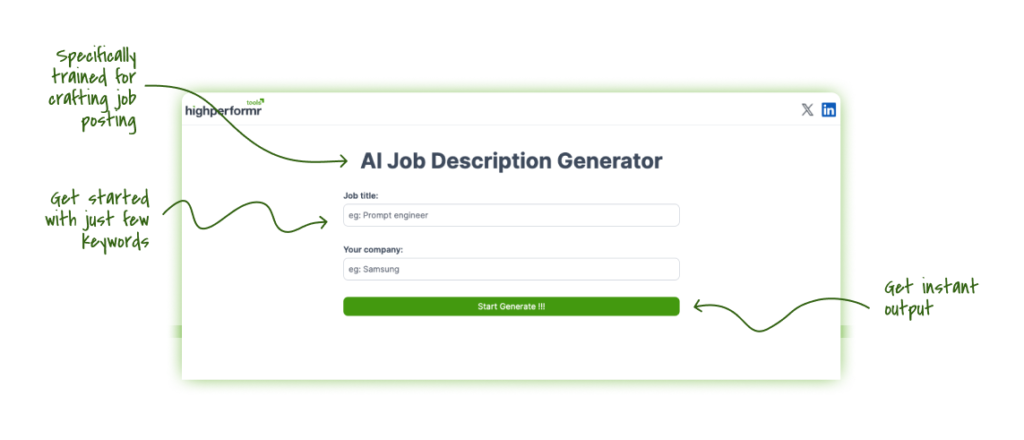
AI Job Description Generator Tool
One of the most challenging aspects of recruitment, especially for tech roles, is crafting compelling and accurate job descriptions. This is where AI truly shines in the recruitment process. It can help you create job postings that not only attract the right candidates but also improve your overall hiring process.
Here’s how AI can help you write better job descriptions:
- Language optimization: AI-powered tools can analyze your job descriptions and suggest improvements to make them more inclusive and appealing to a diverse range of candidates. They can identify and remove gender-biased language, industry jargon, and overly complex terms that might deter potential applicants.
- Skill matching: By analyzing vast amounts of data from successful hires and industry trends, AI can recommend relevant skills and qualifications to include in your job descriptions. This ensures that you’re targeting the right talent pool and setting realistic expectations for the role.
- Customization for tech roles: When it comes to tech positions, AI can help you stay up-to-date with rapidly evolving skill requirements. It can suggest the latest programming languages, frameworks, and tools that are in demand for specific roles, ensuring your job descriptions are current and attractive to tech talent.
- Readability and structure: AI tools can analyze the structure and readability of your job descriptions, suggesting improvements to make them more scannable and engaging. This can include recommendations for bullet points, subheadings, and optimal length.
- Competitive analysis: Some AI-powered platforms can compare your job descriptions to those of your competitors, helping you identify areas where you can differentiate your offering and make your positions more attractive to potential candidates.
Platforms like Workable, Grammarly, and Highperformr offer AI-powered job description tools to enhance your job postings.
Remember, while AI can provide valuable suggestions, it’s essential to maintain your company’s unique voice and culture in the job descriptions. Use AI as a tool to enhance your writing, not replace it entirely.
2. Automating Resume Screening
As a recruiter, you know how time-consuming it can be to sift through hundreds of resumes for a single position. By using AI-powered automation and resume screening, you can significantly reduce the time spent on this task while ensuring that you don’t miss out on top talent.
Here’s how AI-powered resume screening tools can transform your workflow:
- Keyword matching: AI algorithms can scan resumes for specific keywords, skills, and qualifications that match your job requirements. This ensures that candidates with the most relevant experience rise to the top of the pile.
- Ranking candidates: Based on predefined criteria, AI can automatically rank candidates, allowing you to focus on the most promising applicants first.
- Parsing unstructured data: AI can extract relevant information from various resume formats and structures, creating standardized profiles that are easier to compare and evaluate.
- Learning from past hiring decisions: Some AI systems can learn from your previous hiring choices, refining their screening criteria over time to better align with your company’s preferences.
Tools like BrightMove and Zoho Recruit offer AI-powered resume screening features that can streamline your recruitment process. These platforms can integrate with your existing Applicant Tracking System (ATS) to provide a seamless experience.
3. Enhancing Candidate Engagement
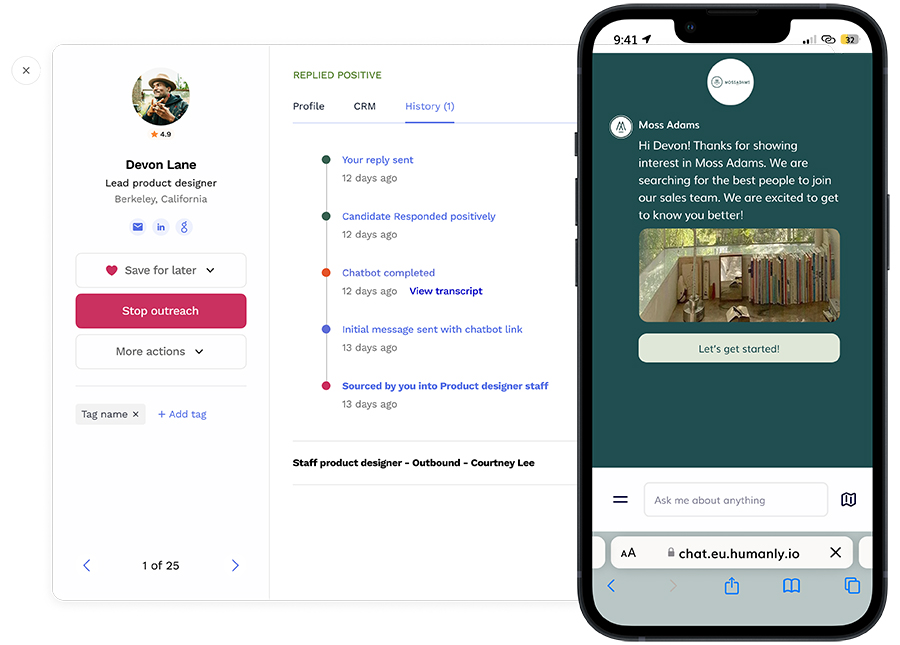
AI chatbots can revolutionize candidate engagement by providing instant responses to queries, scheduling interviews, and offering updates on application status. This ensures a smooth and responsive recruitment process, enhancing the candidate experience.
Here’s how AI can enhance candidate engagement:
- 24/7 availability: AI-powered chatbots can interact with candidates at any time, answering frequently asked questions about the role, company, and application process.
- Data Collection: AI chatbots can gather important information from candidates, such as their qualifications, experience, and preferences, in a conversational manner. This data can be used to pre-screen candidates and provide recruiters with valuable insights.
- Personalized communication: AI can tailor responses based on a candidate’s profile and stage in the recruitment process, providing relevant information and next steps.
- Feedback collection: Use AI to gather feedback from candidates about their experience, helping you continually improve your recruitment process.
Tools like , Paradox, Humanly, and Tiledesk offer AI-powered chatbots and engagement platforms that can significantly enhance your candidate communication strategy.
4. Scheduling Interviews
Coordinating schedules for interviews can be a logistical nightmare, especially when dealing with multiple candidates and interviewers. AI can simplify this process, saving you time and reducing the likelihood of scheduling conflicts.
Here’s how AI can streamline interview scheduling:
- Intelligent calendar integration: AI scheduling tools can sync with your team’s calendars to identify available time slots automatically.
- Candidate self-scheduling: Allow candidates to choose from a list of available time slots, reducing back-and-forth emails.
- Time zone management: For remote or global hiring, AI can handle time zone conversions to avoid confusion.
- Rescheduling assistance: If a candidate or interviewer needs to reschedule, AI can quickly find alternative times and update all parties involved.
- Reminders and confirmations: Automated reminders can be sent to both candidates and interviewers, reducing no-shows and last-minute cancellations.
Tools like Calendly, GoodTime, and Clockwise offer AI-powered scheduling solutions that can integrate with your existing recruitment workflow, making the interview scheduling process smoother and more efficient.
5. Conducting Video Interviews

In today’s increasingly remote and global work environment, video interviews have become an essential part of the recruitment process. AI-driven video interview platforms can take this a step further by providing valuable insights into candidates’ suitability for the role.
Here’s how AI can enhance video interviews:
- Speech analysis: AI can analyze candidates’ speech patterns, tone, and word choice to assess factors like confidence, enthusiasm, and communication skills.
- Body language assessment: AI can analyze posture, gestures, and other non-verbal cues to provide additional insights into a candidate’s personality and potential fit.
- Standardized questioning: AI can ensure that all candidates are asked the same questions in the same order, promoting fairness and consistency in the interview process.
- Automated scoring: Based on predetermined criteria, AI can provide objective scores for different aspects of the interview, helping you compare candidates more effectively.
Tools like HireVue, Spark Hire, and VidCruiter offer AI-powered video interview platforms that can provide these advanced features.
While AI can offer valuable insights, it’s important to remember that these tools should be used as a complement to human judgment, not a replacement. The final hiring decision should always involve human evaluation and consideration of factors that AI may not be able to assess.
6. Assessing Candidates’ Skills
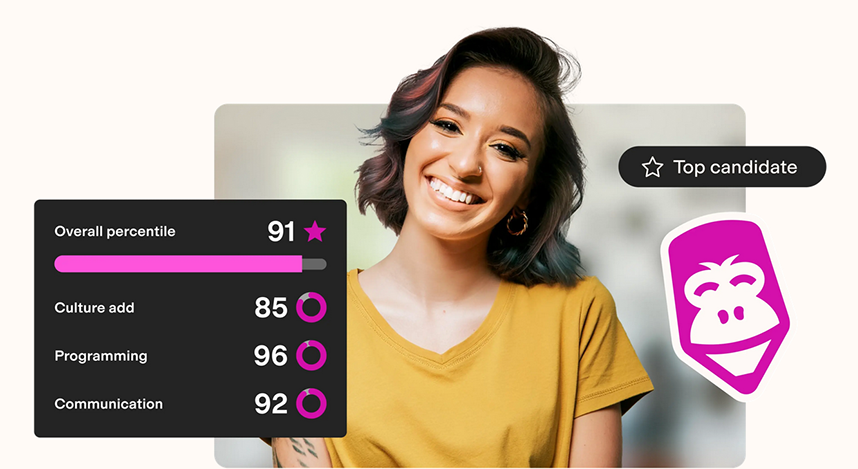
Evaluating candidates’ skills objectively can be challenging, especially for technical roles. AI-based assessment tools can provide a more standardized and comprehensive evaluation of candidates’ abilities.
Here’s how AI can assist in skills assessment:
- Customized tests: AI can generate tailored assessments based on the specific requirements of the role, ensuring that you’re evaluating the most relevant skills.
- Soft skills assessment: Through game-based assessments and simulations, AI can evaluate soft skills such as problem-solving, teamwork, and adaptability.
- Benchmarking: AI can compare candidates’ performance against industry standards or your top performers, giving you a clearer picture of how they stack up.
- Fraud detection: Advanced AI can detect potential cheating or impersonation during online assessments, ensuring the integrity of the evaluation process.
Tools like Pymetrics, Codility, and TestGorilla offer AI-powered skills assessment platforms that can integrate into your recruitment process.
By using AI for skills assessment, you can gain more objective data on candidates’ abilities, leading to more informed hiring decisions and potentially reducing the risk of bad hires.
7. Enhancing Diversity and Inclusion

Promoting diversity and inclusion in the workplace is not just an ethical imperative; it’s also been shown to drive innovation and improve business performance. AI can play a crucial role in creating a more diverse and inclusive hiring process.
Here’s how AI can help:
- Bias detection in job descriptions: AI can identify and suggest alternatives for potentially biased language in job postings, ensuring they appeal to a diverse range of candidates.
- Blind screening: AI can anonymize resumes by removing identifying information related to gender, age, or ethnicity, allowing you to focus solely on qualifications and experience.
- Diverse candidate sourcing: AI can help identify underrepresented talent pools and suggest strategies for reaching out to these communities.
- Diversity analytics: AI can analyze your hiring data to identify potential biases in your recruitment process and suggest areas for improvement.
Tools like Diversio, Brightmine, and Textio offer AI-powered solutions to help promote diversity and inclusion in your recruitment efforts.
By leveraging AI to enhance diversity and inclusion, you can build a more varied and dynamic workforce, which can lead to increased creativity, better problem-solving, and improved company performance.
8. Analyzing Recruitment Metrics
As a recruiter, you know that data-driven decision-making is crucial for improving your hiring process. AI-powered analytics tools can provide deep insights into your recruitment metrics, helping you understand what’s working, what isn’t, and where you can improve.
Here’s how AI can enhance your recruitment analytics:
- Predictive analytics: AI can analyze historical hiring data to predict future hiring needs, time-to-hire, and even candidate success rates.
- Source effectiveness: AI can track which recruitment channels are providing the best candidates, allowing you to optimize your sourcing strategy.
- Performance tracking: By linking recruitment data with employee performance data, AI can help you identify the characteristics of your most successful hires.
- Benchmarking: AI can compare your recruitment metrics against industry standards, helping you set realistic goals and identify areas for improvement.
Tools like LinkedIn Talent Insights, Tableau, Indeed Insights and Visier offer AI-powered analytics solutions that can transform your recruitment data into actionable insights.
By leveraging AI for recruitment analytics, you can continually refine your hiring process, make more informed decisions, and demonstrate the value of your recruitment efforts to stakeholders.
Conclusion
As we’ve explored in this article, AI has the potential to revolutionize nearly every aspect of the recruitment process. From streamlining the initial screening process to enhancing candidate engagement and improving decision-making, AI tools are empowering recruiters to work more efficiently and effectively than ever before.
However, it’s important to remember that AI is a tool, not a replacement for human judgment. The most successful recruitment strategies will be those that strike a balance between leveraging AI’s capabilities and maintaining the human touch that is so crucial in the hiring process.
As you begin to incorporate AI into your recruitment practices, start small and scale up gradually. Experiment with different tools and approaches to find what works best for your organization. Remember, the goal is not just to automate processes, but to enhance the overall quality of your hires and improve the candidate experience.
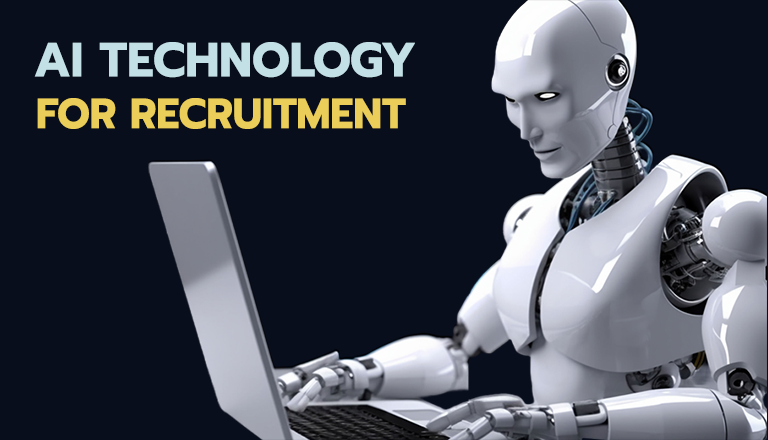
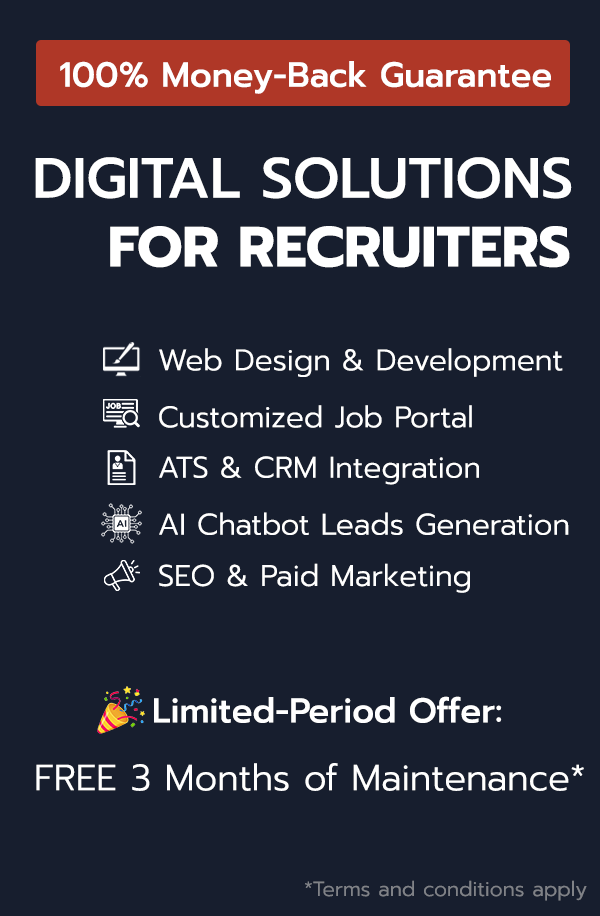

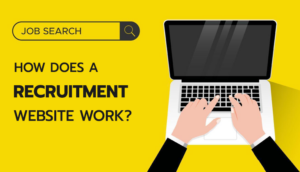
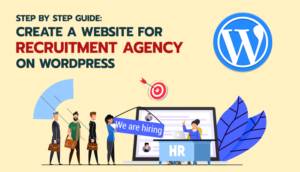
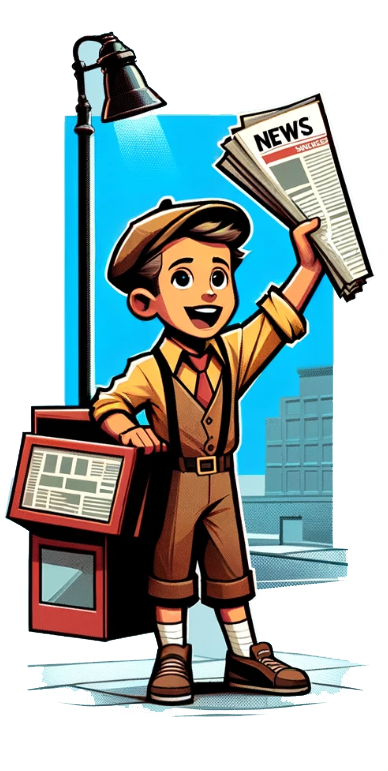
Share Your Thoughts: